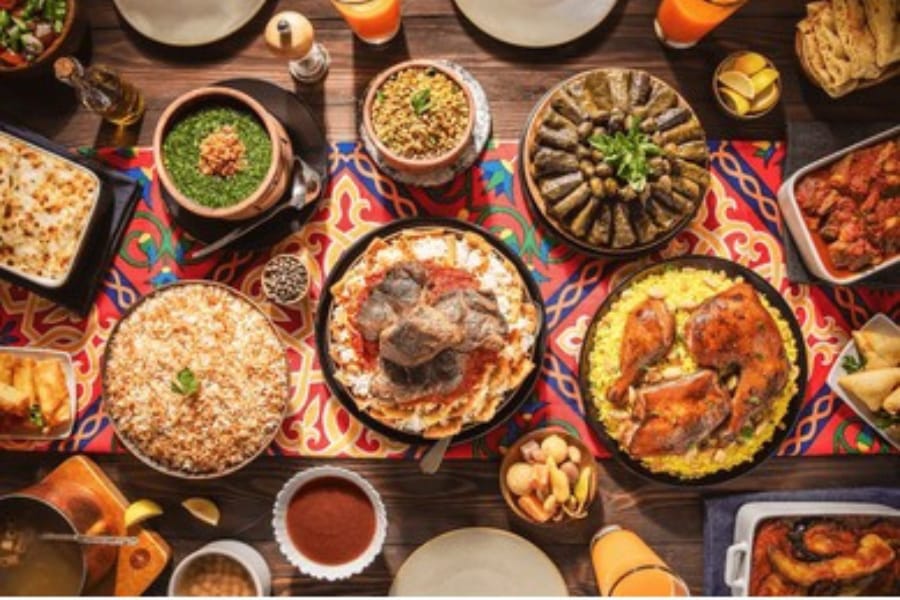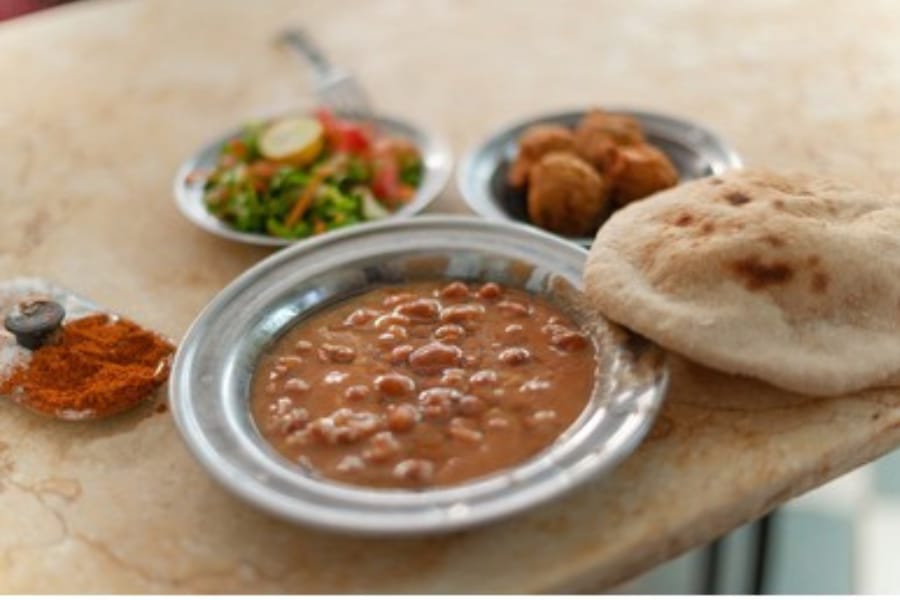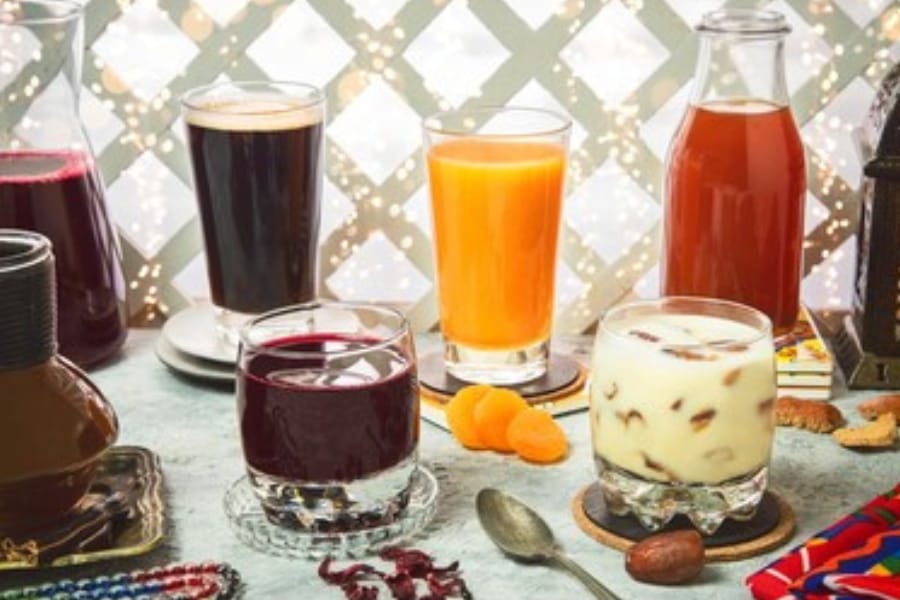Egyptian Food and Traditional Dishes: What to Eat in Egypt?!
When you visit Egypt and look beyond the surface, you’ll discover that Egyptian food isn’t just part of the culture — it is the culture. Egyptian cuisine carries stories passed down through generations, blending the flavors of ancient Egyptian food with the tastes of modern daily life. Every bite captures Mediterranean freshness, Middle Eastern spices, and an African soul — all wrapped into dishes that feel both familiar and unique.
Enjoy the smell of fresh baladi bread in the morning and the bold comfort of a big plate of koshari. Food brings people together in Egypt. Eating is a family affair filled with chatter, storytelling, and tradition. It doesn’t matter whether the dishes are fancy—the simplest plates carry meaning and reflect Egypt’s deep love for flavor, hospitality, and togetherness.
In Egypt, food is a symbol of kindness, celebration, and community all in one. Whether it’s a friendly breakfast at home, a delicious lunch at a street cart, or a luxurious dinner during a festival, every meal invites you to experience the soul of Egyptian life.

Egyptian cuisine combines everyday comfort with deep heritage—simple ingredients, bold flavors, and a strong culture of sharing meals.
Top Traditional Egyptian Dishes You Must Try
No trip to Egypt is complete without immersing yourself in the country’s rich and flavorful cuisine. Egyptian food is about comfort, tradition, and bold tastes. The classics below offer a complete introduction for first-time visitors and returning food lovers alike.
Koshari
A hearty blend of rice, pasta, lentils, chickpeas, tomato sauce, and crispy onions—Egypt’s most beloved street food. Ask for extra da’ah (garlic-vinegar) if you like it tangy.
Ful Medames
Slow-cooked fava beans with olive oil, lemon, and spices. A popular breakfast served with warm baladi bread; filling, affordable, and naturally plant-based.
Molokhia
A fragrant green soup made from jute leaves, tempered with garlic and coriander. Often paired with rice and chicken, silky texture and deep savory notes.
Mahshi
Peppers, zucchini, and vine leaves stuffed with herbed rice. A family favorite on Fridays—comforting, aromatic, and a staple of Egyptian cuisine.
Fattah
Layers of rice, crispy bread, and meat topped with a garlicky vinegar sauce. Traditional for feasts and holidays; rich, celebratory flavor.
Kofta
Grilled minced meat (usually beef or lamb) mixed with spices and shaped into logs. Served with rice, bread, or salad—great for lunch or dinner.
Sayadeya
Fish baked or fried and served with seasoned rice and onions; especially popular in coastal cities like Alexandria for its deep, savory flavor.
For koshari, say “zeyyada da’ah” for more garlic-vinegar sauce. Ordering fattah? Say “bellahma” to get extra meat. Vegetarian visitors can request mahshi “seib”—without meat—while keeping all the aromatic herbs and spices.
Egyptian Street Food: Tasty, Cheap, and Everywhere

If you want to taste Egyptian cuisine, head to the streets. Egyptian street food is fast, affordable, and full of flavor—whether you’re wandering a busy Cairo market, exploring Alexandria’s alleys, or waiting for a microbus.
Falafel (Taameya) — a morning must
Crispy outside and soft inside; made from fava beans, herbs, and spices. Best in sandwiches with salad and tahini for a filling breakfast.
Hawawshi
Spiced minced meat baked inside crispy baladi bread—hot, juicy, and perfect for a quick meal. Ask for chili if you like heat.
Shawarma
Sliced beef or chicken grilled on a vertical rotisserie; usually with garlic sauce, fries, and pickles. A top late-night snack across Egypt.
Batata & Dorra Mashweya
Roasted sweet potatoes sold hot from carts—soft, sweet, and satisfying in winter. In summer, try dorra mashweya (grilled corn), slightly charred and lightly salted.
Choose busy vendors (high turnover = fresher food), watch your meal cooked to order, and keep small change for street stalls. Street favorites range from quick snacks to budget-friendly full meals.
Popular Egyptian Sweets and Desserts

Egyptian food is famous for desserts that are sweet, rich, and made to share. They appear in everyday life and on special occasions—from a quick treat after lunch to festive holidays and feasts.
| Dessert | Description |
|---|---|
| Basbousa | Soft semolina cake soaked in syrup; often topped with coconut or nuts. |
| Konafa | Crispy strands with butter and cream/cheese/nuts, soaked in syrup—especially popular in Ramadan. |
| Atayef | Mini pancakes stuffed with nuts or cream; fried or baked and finished with syrup. |
| Roz Bel Laban | Creamy rice pudding, served warm or cold; often topped with cinnamon or nuts. |
| Om Ali | Warm bread pudding–style dessert with milk, sugar, and nuts. |
| Zalabya | Golden dough balls, deep-fried and soaked in syrup; crispy outside, soft inside. |
| Meshabbek | Sweet, crispy fried dough rings are found in local markets. |
Konafa and atayef peak in Ramadan; basbousa and kahk are Eid staples. Many shops prepare fresh trays daily—buy early for the best texture.
Bread and Dips – The Heart of Every Egyptian Meal
In Egyptian cuisine, baladi bread is more than just bread—it’s a way of eating. This round, whole-wheat flatbread is soft inside, slightly crispy outside, and always served warm. It’s used to scoop up everything from beans to salads to meat.
What really completes the experience are the dips and sides that come with it:
- Tahina: Creamy sesame paste with lemon and garlic.
- Baba Ghanoush: Smoky eggplant dip with tahina and lemon.
- Dakka: Dry spice mix for dipping with oil—simple and bold.
- Salata Baladi: Fresh salad with tomato, cucumber, pepper, carrots, and parsley.
- Zaalouk: Chunky eggplant, tomato, and garlic dip.
- White Cheese: Soft cheese often mixed with tomato or olive oil.
- Moussaka (Messa’a’a): Fried eggplant layered with tomato sauce and garlic; great hot or cold with bread.
Tahina and baba ghanoush contain sesame; dakka can be spicy. Ask for “mafish har” (no heat) if you prefer mild dips.
What to Drink in Egypt: Traditional Beverages

Alongside unforgettable Egyptian food, Egypt offers a wide range of traditional drinks—refreshing, flavorful, and perfect for every season.
| Drink | What it is | When to try |
|---|---|---|
| Karkadeh | Hibiscus tea, hot or cold—sweet and fruity. | Iced in summer; soothing hot in winter. |
| Sobia | Cold, creamy coconut drink; Ramadan favorite. | Hot days, street carts, and iftar time. |
| Erk Sous | Bold, herbal licorice drink. | Midday refreshment; best fresh. |
| Sugarcane Juice | Fresh-pressed, naturally sweet and energizing. | Anytime—classic juice shop staple. |
| Mint Tea | Light black tea with fresh mint. | After meals; evening wind-down. |
| Turkish Coffee | Rich, intense coffee in small cups. | Post-meal pick-me-up or café stop. |
Ask for “sukkar a’alil” (less sugar) at juice shops. Try karkadeh iced in summer and hot in winter to enjoy its flavor year-round.
Eating Like a Local: Tips for Tourists
To truly taste Egypt, skip fancy restaurants sometimes and explore local spots. Family-run eateries, bustling food stalls, and neighborhood markets are where you’ll find authentic Egyptian cuisine.
Where to Eat
Try koshari from a corner shop, ful and taameya from a street cart, or mahshi in a small local diner. Don’t be afraid to explore side streets—some of the best bites are hidden gems!
Food Safety Tips
Choose busy places (high turnover means fresher food), drink bottled water, and avoid raw vegetables unless you’re sure they’re washed well. For street food, watch it being prepared fresh.
Vegetarian-Friendly
Egypt is surprisingly veggie-friendly! Ful medames, taameya, lentil soup, koshari, and mahshi (without meat) are great plant-based options.
Dining Etiquette
Meals are often shared, especially in homes. It’s common to dip bread into dishes, so always use your right hand. If someone invites you to try their homemade food, don’t miss the chance!
Choose busy spots for freshness, opt for bottled water, watch your meal being cooked, try local vegetarian staples like koshari and ful, and keep small change handy for street stalls.
Conclusion – Why Egyptian Food Is a Must-Try Experience
Egyptians don’t consider Egyptian food just a meal—it’s a strong bond with history, culture, and community. There’s a story behind every dish, from ancient traditions to family kitchens and street corners. With warm hospitality, unforgettable flavors, and something for every taste, Egyptian cuisine invites you to eat like a local and feel right at home.
Whether you’re walking through Cairo’s streets or cooking koshari in your own kitchen, tasting Egyptian food is an experience you won’t forget. Grab a piece of baladi bread and start your flavor adventure!
Love Egyptian food? Discover our guides to Cairo food during the tours, Alexandria’s seafood, and traditional oases cuisine in Siwa and Faiyuum on your next trip.
Ready to experience Egypt beyond its incredible flavors? Come and explore Egypt’s rich history, breathtaking landmarks, and vibrant culture while tasting its most delicious traditional dishes and refreshing drinks.
Check out our Egypt Tour Packages and start your unforgettable journey today!
FAQs about Egyptian Food
Is Egyptian food spicy? Not usually. Most dishes are mildly seasoned, and heat is added on the side with chili pastes or pickles.
Is Egyptian cuisine vegetarian-friendly? Yes—ful medames, taameya, koshari, lentil soup, and mahshi seib (without meat) are common options.
Is the food halal? In Egypt, meat is generally halal by default. Pork is uncommon; beef, lamb, and chicken are typical.
How much does street food cost? The cost varies by city and shop, but street snacks remain a budget-friendly option compared to restaurants.





